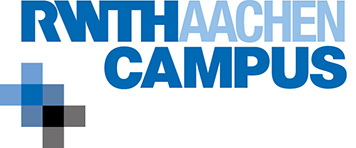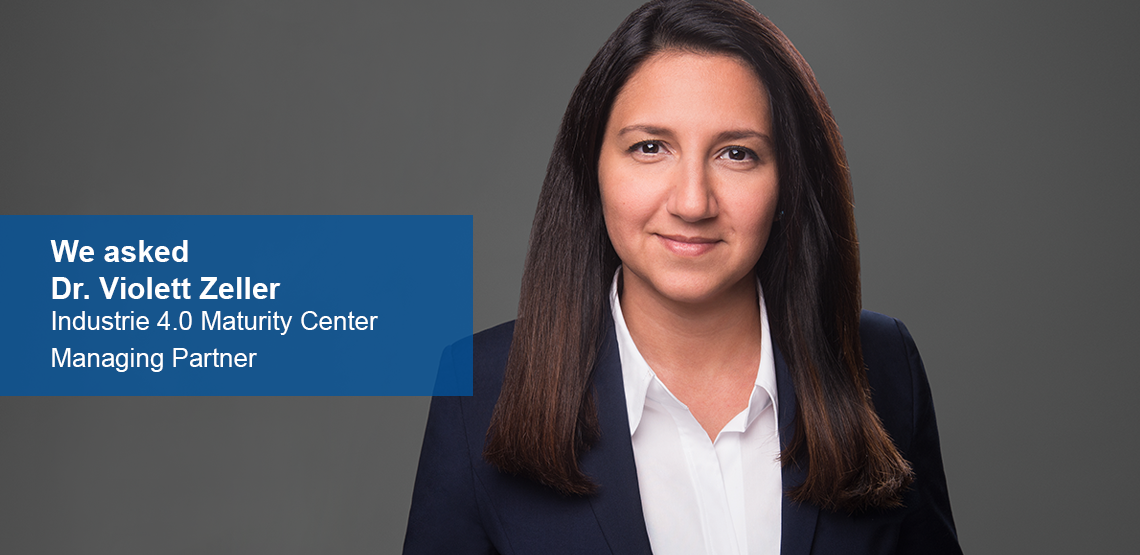18. September 2018
As managing partner, Dr. Violett Zeller is responsible for the strategic direction and ongoing development of the Industrie 4.0 Maturity Center in the Smart Logistics Cluster. She has also been Head of Information Management department at FIR of RWTH Aachen since 2015. Her role furthermore includes a responsibility for the strategic development of the acatech Industrie 4.0 Maturity Index.
You have recently completed your doctorate. What was the topic of your dissertation?
My dissertation dealt with the development of a procedure to improve IT service provision processes. In our time of networked digitalization, many internal IT organizations in the manufacturing industry still use a lot of resources to realize robust IT services with a robust IT operation. That means there is very little time and budget left to focus on strategic topics or to play an active role in the implementation of a digitalization strategy. In my opinion, internal IT organizations are essential players in the realization of digital transformation within a company. The IT organization must take on new tasks and develop specific skills, for example ambidexterity. An ambidextrous approach in an IT organization means to be able to tackle new strategic topics quickly, while at the same time keeping an eye on legacy systems. In my view, this is an additional core competence that not just IT organizations, but companies in general must develop.
You co-founded the Industrie 4.0 Maturity Center in the spring of 2017. What was the basic idea behind your center?
The idea was born in 2015 at Hanover Trade Fair with the help of several partners. It centered on the premise that the development of a maturity model would provide manufacturing companies with a valid assessment method that would allow them to capture the current Industrie 4.0 status of their facilities. On that basis, companies would be able to develop customized action recommendations for the successful introduction of Industrie 4.0 solutions. Under the patronage of acatech, we were able to develop the “acatech Industrie 4.0 Maturity Index” alongside renowned partners from research and industry, which was then introduced at Hanover Trade Fair in 2017 – thus the circle is complete. Multiple voices from the project consortium, as well as the acatech committee felt that a stabilization of the application and a bundling of follow-up activities of the Maturity Index should be driven by an independent entity to allow the index to achieve the status of an international de facto standard. That is how we came up with the idea for the Industrie 4.0 Maturity Center.
What exactly is an Industrie 4.0 Maturity Index? Why is it so important for companies to have this type of index?
The Industrie 4.0 Maturity Index is an important tool that allows companies to systematically manage their transformation towards Industrie 4.0. A systematic approach is essential to make sure that each individual action achieves results and that projects can be planned in a meaningful sequence – that will keep costs calculable and companies can decide their own pace. One special feature of our index is that it analyzes all value creation processes in a company (production, logistics, sales and marketing, as well as research and development), which allows a holistic assessment of the Industrie 4.0 maturity for each company individually. Only then can needs-oriented solutions be developed and implemented. The maturity scale is defined by six benefit-oriented development stages, which means not only the degree of technology progress is the deciding factor. More important are digital capabilities, which are needed to achieve a specific business purpose (profit, cost reduction, flexibility). The degree of the relevant Industrie 4.0 capabilities forms the basis for the deduction of individual actions. Another feature: Our model maps the multi-dimensional aspects of Industrie 4.0 in the context of information systems, resources, business organization and company culture. We therefore see Industrie 4.0 “only” as a means to an end that enables companies to develop into digital, agile organizations capable of learning in all their business dimensions. That is a prerequisite for any company that wants to be successful in their market now and in the future.
What was it like for you to be involved in the strategic development of a center right from the start? How did you cope with the double workload while working on your doctorate?
Well, it was an exciting experience to develop a robust business model from the results of a research project. I think this doesn’t happen often enough in Germany. And where in Germany could you realize such an idea better than on RWTH Aachen Campus? We found the framework conditions of the campus a perfect fit for developing a business. We found a robust basis of institutes and industry partners here that offered the necessary resources and knowledge exchange on site. We have everything we need in terms of equipment and tools to develop a center quickly and incrementally. I personally enjoyed working on founding the center with the project core team of the acatech study. That is how I hardly felt the extra workload during the founding time and I had an opportunity to demonstrate my own ambidexterity. One important aspect here was that I was able to work with the “dream team” I had wanted and that we had partners from academia and industry on board as well. I was therefore very motivated to push the envisaged spin-off.
What are you and your members working on in the Industrie 4.0 Maturity Center right now? And in what way are your members taking advantage of the RWTH Aachen Campus ecosystem?
We, the Industrie 4.0 Maturity Center, are a neutral platform that defines ways for the digital transformation of manufacturing companies and industrial service providers, as well as technology providers and consulting companies. Our work doesn’t just enable these to apply the Maturity Index. Our members and customers also very much appreciate the fact that we support them on their way from the initial Industrie 4.0 strategy and roadmap development to the operative implementation of Industrie 4.0 solutions and that we accompany them on their way towards digital transformation. Since the center was founded in April 2017, we were able to apply the index in more than 30 companies and have continuously achieved new findings. An image has been forming about the reality of the status quo in mid-sized manufacturing companies and what the most difficult challenges for these companies are. We and our members utilize the RWTH Aachen Campus ecosystem for knowledge exchanges with experts and for cooperations at intersections with related topic areas. We will, for example, work with the Center Smart Services – another center in the Smart Logistics Cluster – on the further development of the Maturity Index. This project focuses on enabling a manufacturing company to assess its own digital capabilities, which are prerequisite to implementing the envisaged digital business model. Our center and our objectives are therefore in good company right here on RWTH Aachen Campus.


